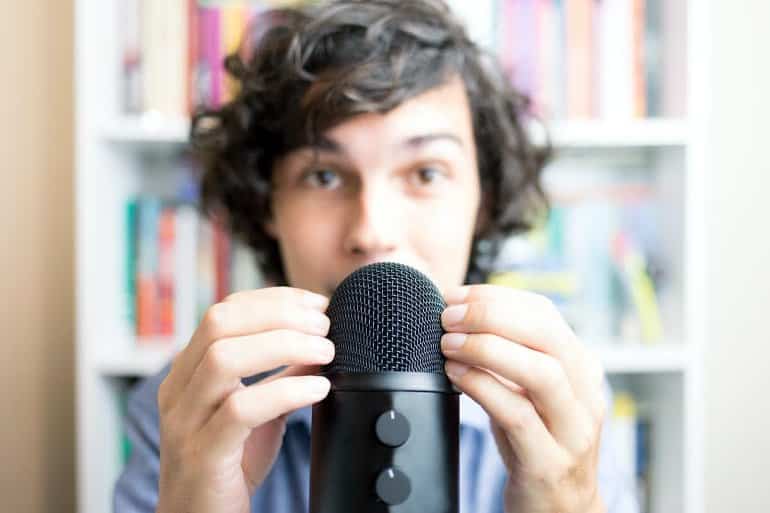Summary: People who enjoy ASMR have heightened sensory sensitivity, a new study reports. Many people who react positively to ASMR also experience higher levels of bodily awareness, greater sensitivity to bodily sensations, and often are easily overstimulated by their environment.
Source: The Conversation
Do you ever experience a tingling sensation in your scalp when someone whispers?
If you recognize that feeling, then you may well be acquainted with the phenomenon that’s gathered millions of followers over the last few years, and has been dubbed “autonomous sensory meridian response” (ASMR).
For those of you who haven’t heard of ASMR, it’s a relaxing head-orientated tingling sensation that some people experience in response to various sensory “triggers”. It could be watching someone brush hair, or fold laundry with care and expertise or certain sounds like whispering or tapping. And in everyday life, one of the most common triggers is actually soft touch – like stroking someone’s arm or tracing fingers on the back.
Some people report experiencing ASMR for “as long as they can remember” – but the explosion of online ASMR videos is allowing people to tap into the sensation on-demand rather than having to wait for it to happen as they go about their daily lives. And many people (even those that don’t experience ASMR tingling) may use them for relaxation and sleep.
But an intriguing question that remains unanswered is why only some people experience ASMR tingling.
We recently conducted a study which goes some way towards answering this question. It seems that people who experience ASMR have heightened sensory sensitivity – that is, they are more sensitive to what’s going on around them, and inside them. Here’s how we found out, and what it means.
Sensitivity explained
We all differ in how sensitive we are to information from our five external senses (touch, sight, hearing, smell and taste). If you’re highly sensitive to external input you might be disgusted at the strong smell of an aftershave as you pass someone in the street, for example.
We also vary in sensitivity to our body’s internal state, such as whether we’re feeling hungry or cold.
So, to investigate whether people with ASMR are more “sensitive”, we tested participants using the most commonly used measures of internal and external sensory sensitivity. The adult sensory profile, for example, asked participants to rate their response in numerous situations (such as how well they work with background noise or whether they startle easily at unexpected or loud noises).
We also assessed whether participants experience ASMR when exposed to 16 common triggers, and if so, the strength of their ASMR response and how they experienced it.
Sensitivity links to ASMR
It turned out that people who experience ASMR showed much higher levels of sensory sensitivity than people without ASMR.
They report hypersensitivity and negative responses to external stimuli such as noise and movement, and are easily overstimulated by their environment. They also show higher levels of body awareness and greater sensitivity to internal bodily sensations – noticing how their body changes when they feel happy, for example.
And the strength of their ASMR response was also associated with heightened external sensitivity and greater control over their attention towards their body and emotional state.
We think that the concept of the “highly sensitive person” (HSP) may be central for differentiating ASMR responders from non-responders.
Using a flower metaphor, developed by researchers to distinguish between people who have different levels of sensitivity – both internal and to the external social environment, such as people and visual stimuli – our study found that 56% of ASMR responders were categorised as highly sensitive “orchids” (who do well in ideal conditions but badly in poor conditions) with only 12% categorised as the environmentally resilient “dandelions”. The remainder were “tulips” who lie somewhere in between.
This contrasts with other studies suggesting that highly sensitive orchids usually make up around 30% of the population.
As people with ASMR are more likely to be classified as highly sensitive, that might go some way towards explaining why ASMR has been linked to empathy. HSPs process social information more deeply which is thought to underpin their ability to be more attuned and responsive to others’ emotions and needs. Future research may find similar enhanced social and emotional processing abilities in people with ASMR, but this needs to be properly investigated.

ASMR has been shown to enhance feelings of social connection and the strongest ASMR triggers often simulate situations involving interpersonal closeness, intimacy, and touch. It may be that people who experience ASMR also derive more emotional benefit from social interactions. One fascinating possibility is that the tingling of ASMR reflects the ability to simulate social touch and its benefits – such as stress reduction and mental well-being – from non-tactile stimuli.
There is one intriguing paradox: the same people who experience and enjoy ASMR triggers can often also be repulsed by the same sounds in different circumstances. ASMR-sensitive people have elevated levels of misophonia (a condition describing aversive and angry feelings in response to certain sounds, such as tapping, chewing or lip smacking), with 43% experiencing it.
If the same trigger sounds elicit opposite emotional reactions in the same people, then this could mean that there isn’t anything inherently pleasant or unpleasant about the sounds themselves.
Our findings suggest that one reason for this seemingly odd co-occurrence might be because both ASMR and misophonia are underlined by increased sensory sensitivity, especially to sound. The situation, and how the sensory information is translated into an emotional response, might then determine whether the same sound is evaluated as positive or negative by the same person. Being sensitive has many benefits – but as with all things in life, it has its complications too.
About this ASMR research news
Author: Giulia Poerio
Source: The Conversation
Contact: Giulia Poerio – The Conversation
Image: The image is in the public domain







